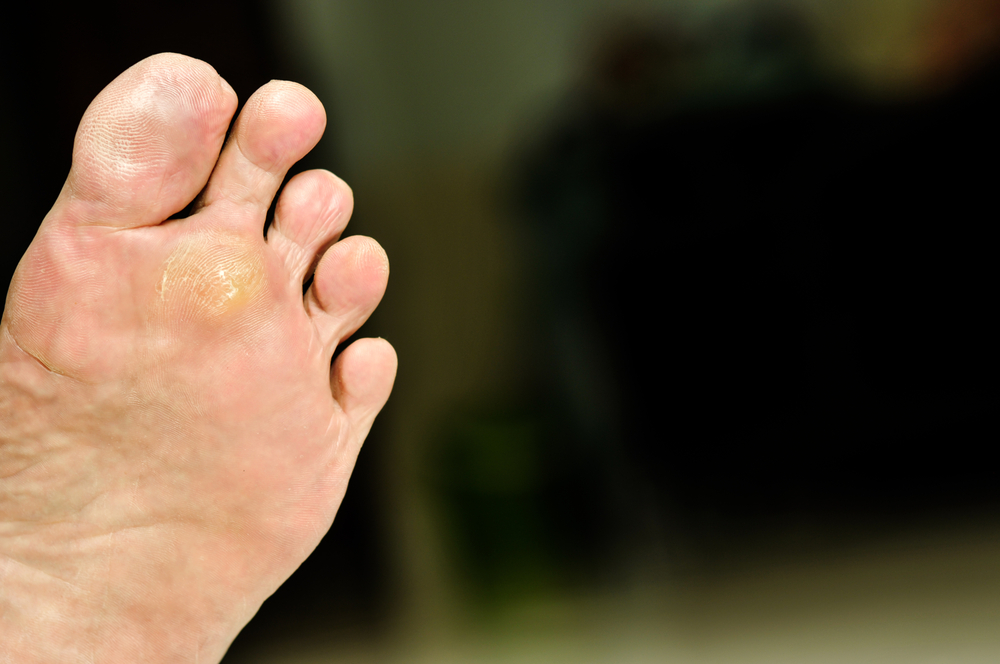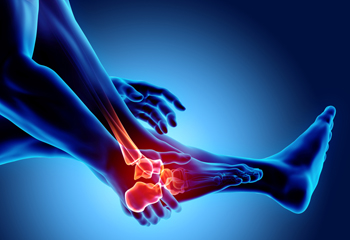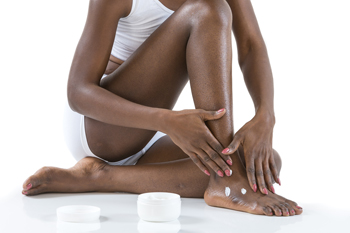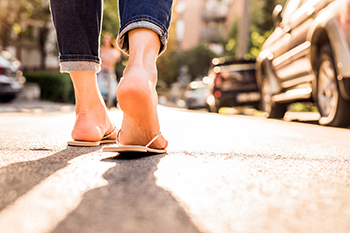3885 S. Decatur Blvd Suite #1080
Las Vegas, NV 89103

A wart is a growth on the skin caused by over 100 types of the human papillomavirus (HPV). The virus causes a thickening of the top skin layer. Plantar warts occur on the soles of the feet. These can look and feel like calluses. Anyone can get warts, but children aged 12 to 16 and those who have HIV, organ transplants, or are on chemotherapy are at the highest risk for them. Warts are often acquired from a person that has the virus. While not highly contagious, the virus can enter the skin through small cuts or cracks. It is suggested that towels and other intimate objects not be shared, and shoes be worn in public places. Warts are typically harmless and painless, but plantar warts might feel tender when walked on. These warts can be small, or they can grow to cover most of the sole of the foot. They often go away on their own, but this can take up to two years. If your teen has a plantar wart that is bothersome or interferes with their normal daily activities, please consult a podiatrist for treatment options.
Plantar warts can be very uncomfortable. If you need your feet checked, contact Loren Hansen, DPM from Ankle & Foot Medical Center. Our doctor will assist you with all of your foot and ankle needs.
About Plantar Warts
Plantar warts are the result of HPV, or human papillomavirus, getting into open wounds on the feet. They are mostly found on the heels or balls of the feet.
While plantar warts are generally harmless, those experiencing excessive pain or those suffering from diabetes or a compromised immune system require immediate medical care. Plantar warts are easily diagnosed, usually through scraping off a bit of rough skin or by getting a biopsy.
Symptoms
Treatment
To help prevent developing plantar warts, avoid walking barefoot over abrasive surfaces that can cause cuts or wounds for HPV to get into. Avoiding direct contact with other warts, as well as not picking or rubbing existing warts, can help prevent the further spread of plantar warts. However, if you think you have developed plantar warts, speak to your podiatrist. He or she can diagnose the warts on your feet and recommend the appropriate treatment options.
If you have any questions please feel free to contact our office located in Las Vegas, NV . We offer the newest diagnostic and treatment technologies for all your foot and ankle needs.

Arthritis in the feet can cause severe pain and discomfort. It is possible that relief can be found when specific methods are practiced. Self-management techniques can include learning how to reduce stress, improve mood, and generally feel more in control of health issues. This is instrumental in managing some of the pain that is associated with arthritic feet. Additionally, physical activity is linked to an improved sense of well-being, and it may help to eliminate some of the discomforts that occur with feet that have arthritis. Research has indicated it is beneficial to lose weight with existing arthritis, often improving foot mobility and range of motion. It is important to incorporate a gentle exercise program into the daily routine which may help to reduce the risk of injury in completing daily activities. If you have arthritis in your feet, it is strongly urged that you routinely visit a podiatrist who can guide you toward proper management and relief tactics.
Arthritis can be a difficult condition to live with. If you are seeking treatment, contact Loren Hansen, DPM from Ankle & Foot Medical Center. Our doctor can provide the care you need to keep you pain-free and on your feet.
Arthritic Foot Care
Arthritis is a term that is commonly used to describe joint pain. The condition itself can occur to anyone of any age, race, or gender, and there are over 100 types of it. Nevertheless, arthritis is more commonly found in women compared to men, and it is also more prevalent in those who are overweight. The causes of arthritis vary depending on which type of arthritis you have. Osteoarthritis for example, is often caused by injury, while rheumatoid arthritis is caused by a misdirected immune system.
Symptoms
Arthritic symptoms range in severity, and they may come and go. Some symptoms stay the same for several years but could potentially get worse with time. Severe cases of arthritis can prevent its sufferers from performing daily activities and make walking difficult.
Risk Factors
If you suspect your arthritis is affecting your feet, it is crucial that you see a podiatrist immediately. Your doctor will be able to address your specific case and help you decide which treatment method is best for you.
If you have any questions, please feel free to contact our office located in Las Vegas, NV . We offer the newest diagnostic and treatment technologies for all your foot care needs.

Many people are experts in taking care of different parts of their body, but may lack the enthusiasm to properly care for their feet. This may lead to getting unwanted foot conditions, such as fungal infections, cracked skin, or corns. The feet may need to have additional pampering in the colder months, when they can become dry from the weather. There are basic methods that can be implemented, which can make the feet feel better. These can include washing them daily, followed by applying a good moisturizer. It can be helpful to exfoliate the skin on the feet on a monthly basis by using a loofah or pumice stone, in addition to soaking the feet in warm water every other week. One of the most important things that can be done for the feet is to wear shoes that are comfortable and fit well. It is suggested to limit the time wearing high heels, and this may help to prevent hammertoe and bunions from developing. If you would like more information about how to care for your feet daily, please ask a podiatrist who can provide you with helpful tips.
Everyday foot care is very important to prevent infection and other foot ailments. If you need your feet checked, contact Loren Hansen, DPM from Ankle & Foot Medical Center. Our doctor can provide the care you need to keep you pain-free and on your feet.
Everyday Foot Care
Often, people take care of their bodies, face and hair more so than they do for their feet. But the feet are a very important aspect of our bodies, and one that we should pay more attention to. Without our feet, we would not be able to perform most daily tasks.
It is best to check your feet regularly to make sure there are no new bruises or cuts that you may not have noticed before. For dry feet, moisturizer can easily be a remedy and can be applied as often as necessary to the affected areas. Wearing shoes that fit well can also help you maintain good foot health, as well as making it easier to walk and do daily activities without the stress or pain of ill-fitting shoes, high heels, or even flip flops. Wearing clean socks with closed shoes is important to ensure that sweat and bacteria do not accumulate within the shoe. Clean socks help to prevent Athlete’s foot, fungi problems, bad odors, and can absorb sweat.
If you have any questions please feel free to contact our office located in Las Vegas, NV . We offer the newest diagnostic and treatment technologies for all your foot and ankle needs.

There are many differences of opinion concerning flip-flops and the feet. Despite the ease and choice of several designs and colors to choose from, wearing these types of shoes may have detrimental effects on the feet. Flip-flops are made of rubber material, with a thin piece separating the big toe from the other toes. They generally have little or no arch support, and the toes work harder than usual to keep the shoe on the foot. It is beneficial to wear flip-flops for a limited time, such as going to the beach or pool, followed by wearing a more supportive shoe at the end of the day. There are flip-flops that are made of sturdier materials, in addition to having a strap on the back. This may be helpful in preventing cracked heels from developing. Flip-flops can be fun to wear, and if you desire to do so, it is suggested that you confer with a podiatrist who can guide you toward the best type of this shoe to purchase.
Flip-flops can cause a lot of problems for your feet. If you have any concerns about your feet or ankles, contact Loren Hansen, DPM from Ankle & Foot Medical Center. Our doctor will assist you with all of your foot and ankle needs.
Flip-Flops and Feet
Flip-flops have managed to become a summer essential for a lot of people. While the shoes may be stylish and easy to slip on and off, they can be dangerous to those who wear them too often. These shoes might protect you from fungal infections such as athlete’s foot, but they can also give you foot pain and sprained ankles if you trip while wearing them.
When Are They Okay to Wear?
Flip-flops should only be worn for very short periods of time. They can help protect your feet in places that are crawling with fungi, such as gym locker rooms. Athlete’s foot and plantar warts are two common fungi that flip-flops may help protect your feet against.
Why Are They Bad for My Feet?
These shoes do not offer any arch support, so they are not ideal for everyday use. They also do not provide shock absorption or heel cushioning which can be problematic for your feet. Additionally, you may suffer from glass cuts, puncture wounds, and stubbed toes since they offer little protection for your feet.
More Reasons Why They Are Bad for Your Feet
If you have any questions, please feel free to contact our office located in Las Vegas, NV . We offer the newest diagnostic and treatment technologies for all your foot care needs.